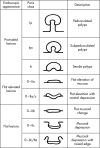Endoscopic mucosal resection for flat neoplasia in chronic ulcerative colitis: can we change the endoscopic management paradigm?
- PMID: 17135310
- PMCID: PMC1954845
- DOI: 10.1136/gut.2006.106294
Endoscopic mucosal resection for flat neoplasia in chronic ulcerative colitis: can we change the endoscopic management paradigm?
Abstract
Background: The potential of endoscopic mucosal resection (EMR) for treating flat dysplastic lesions in chronic ulcerative colitis (CUC) has not been addressed so far. Historically, such lesions were referred for colectomy. Furthermore, there are only limited data to support endoscopic resection of exophytic adenoma-like mass (ALM) lesions in colitis.
Aims: To evaluate the safety and clinical outcomes of patients with colitis undergoing EMR for Paris class 0-II and class I ALM compared with sporadic controls. Secondary aims were to re-evaluate the prevalence, anatomical "mapping" and histopathological characteristics of both Paris class 0-II and class I lesions in the context of CUC.
Methods: Prospective clinical, pathological and outcome data of patients with colitis-associated Paris class 0-II and Paris class I ALM treated with EMR (primary end points being colorectal cancer development, resection efficacy, metachronous lesion rates and post-resection recurrence rates) were compared with those of sporadic controls.
Results: 204 lesions were diagnosed in 169 patients during the study period: 167 (82%) diagnosed at "entry" colonoscopy, and 36 (18%) diagnosed at follow-up. 170 ALMs, 18 dysplasia-associated lesion masses (DALMs) and 16 cancers were diagnosed. A total of 4316 colonoscopies were performed throughout the study period (median per patient: 6; range: 1-8). The median follow-up period for the complete cohort was 4.1 years (range: 3.6-5.21). 1675 controls were included from our prospective database of patients without CUC who had undergone EMR for sporadic Paris class 0-II and snare polypectomy of Paris type I lesions from 1998 onwards, and were considered to be at moderate to high lifetime risk of colorectal cancer. 3792 colonoscopies were performed throughout the study period in this group (median per patient: 4; range: 1-7). The median follow-up period was 4.8 years (range: 2.9-5.2). No statistically significant differences were observed between the CUC study group and controls with respect to age, sex, median number of colonoscopies per patient, median follow-up duration, post-resection complications, median lesional diameter or interval cancer rates. However, there was a significant between-group difference regarding the prevalence of Paris class 0-II lesions in the CUC group (82/155 (61%)) compared with controls (285/801 (35%); chi(2) = 31.13; p<0.001). Furthermore, recurrence rates of lateral spreading tumours were higher in the colitis cohort (1/7 (14%)) than among controls (0/10 (0%); p = 0.048 (95% CI 11.64% to 40.21%)).
Conclusions: Flat DALM, similarly to Paris class I ALM, can be managed safely by EMR in CUC. A change in management paradigm to include EMR for the resection of flat dysplastic lesions in selected cases is proposed.
Conflict of interest statement
Competing interests: None.
Similar articles
-
Endoscopic resection of adenoma-like mass in chronic ulcerative colitis using a combined endoscopic mucosal resection and cap assisted submucosal dissection technique.Inflamm Bowel Dis. 2008 Oct;14(10):1380-6. doi: 10.1002/ibd.20497. Inflamm Bowel Dis. 2008. PMID: 18465807
-
Sporadic adenoma in ulcerative colitis: endoscopic resection is an adequate treatment.Gut. 2006 Aug;55(8):1151-5. doi: 10.1136/gut.2005.075531. Epub 2006 Jan 19. Gut. 2006. PMID: 16423892 Free PMC article.
-
EMR using dextrose solution versus sodium hyaluronate for colorectal Paris type I and 0-II lesions: a randomized endoscopist-blinded study.Endoscopy. 2008 Feb;40(2):110-4. doi: 10.1055/s-2007-966987. Endoscopy. 2008. PMID: 18253905 Clinical Trial.
-
Adenomas and adenoma-like DALMs in chronic ulcerative colitis: a clinical, pathological, and molecular review.Am J Gastroenterol. 1999 Jul;94(7):1746-50. doi: 10.1111/j.1572-0241.1999.01201.x. Am J Gastroenterol. 1999. PMID: 10406230 Review.
-
Endoscopic management of nonpolypoid colorectal lesions in colonic IBD.Gastrointest Endosc Clin N Am. 2014 Jul;24(3):435-45. doi: 10.1016/j.giec.2014.03.003. Epub 2014 May 6. Gastrointest Endosc Clin N Am. 2014. PMID: 24975534 Review.
Cited by
-
Surgical procedure for sporadic colorectal cancer in patients with mild ulcerative colitis.Case Rep Gastroenterol. 2012 Sep;6(3):635-42. doi: 10.1159/000343251. Epub 2012 Sep 29. Case Rep Gastroenterol. 2012. PMID: 23139655 Free PMC article.
-
Advanced endoscopic resection for colorectal dysplasia in inflammatory bowel disease: a meta-analysis.Endosc Int Open. 2022 May 13;10(5):E593-E601. doi: 10.1055/a-1784-7063. eCollection 2022 May. Endosc Int Open. 2022. PMID: 35571465 Free PMC article.
-
Laparoscopic-assisted ileal pouch-rectal muscle sheath anastomosis for the treatment of familial adenomatous polyposis.Int J Colorectal Dis. 2011 Aug;26(8):1051-7. doi: 10.1007/s00384-011-1186-8. Epub 2011 Apr 8. Int J Colorectal Dis. 2011. PMID: 21476029 Clinical Trial.
-
Treatment outcomes of endoscopic submucosal dissection and surgery for colorectal neoplasms in patients with ulcerative colitis.United European Gastroenterol J. 2021 Oct;9(8):964-972. doi: 10.1002/ueg2.12118. Epub 2021 Jul 7. United European Gastroenterol J. 2021. PMID: 34232561 Free PMC article.
-
ESD and Pit Pattern Diagnosis: Lessons from a Japanese Endoscopist Working in the United States.Clin Colon Rectal Surg. 2020 Nov;33(6):329-334. doi: 10.1055/s-0040-1714235. Epub 2020 Sep 4. Clin Colon Rectal Surg. 2020. PMID: 33162836 Free PMC article. Review.
References
-
- Eaden J A, Mayberry J F. Colorectal cancer complicating ulcerative colitis: a review. Am J Gastroenterol 2000952710–2719. - PubMed
-
- Engelsgjerd M, Farraye F A, Odze R D. Polypectomy may be adequate treatment for adenoma‐like dysplastic lesions in chronic ulcerative colitis. Gastroenterology 19991171288–1294. - PubMed
Publication types
MeSH terms
LinkOut - more resources
Full Text Sources
Other Literature Sources
Medical




